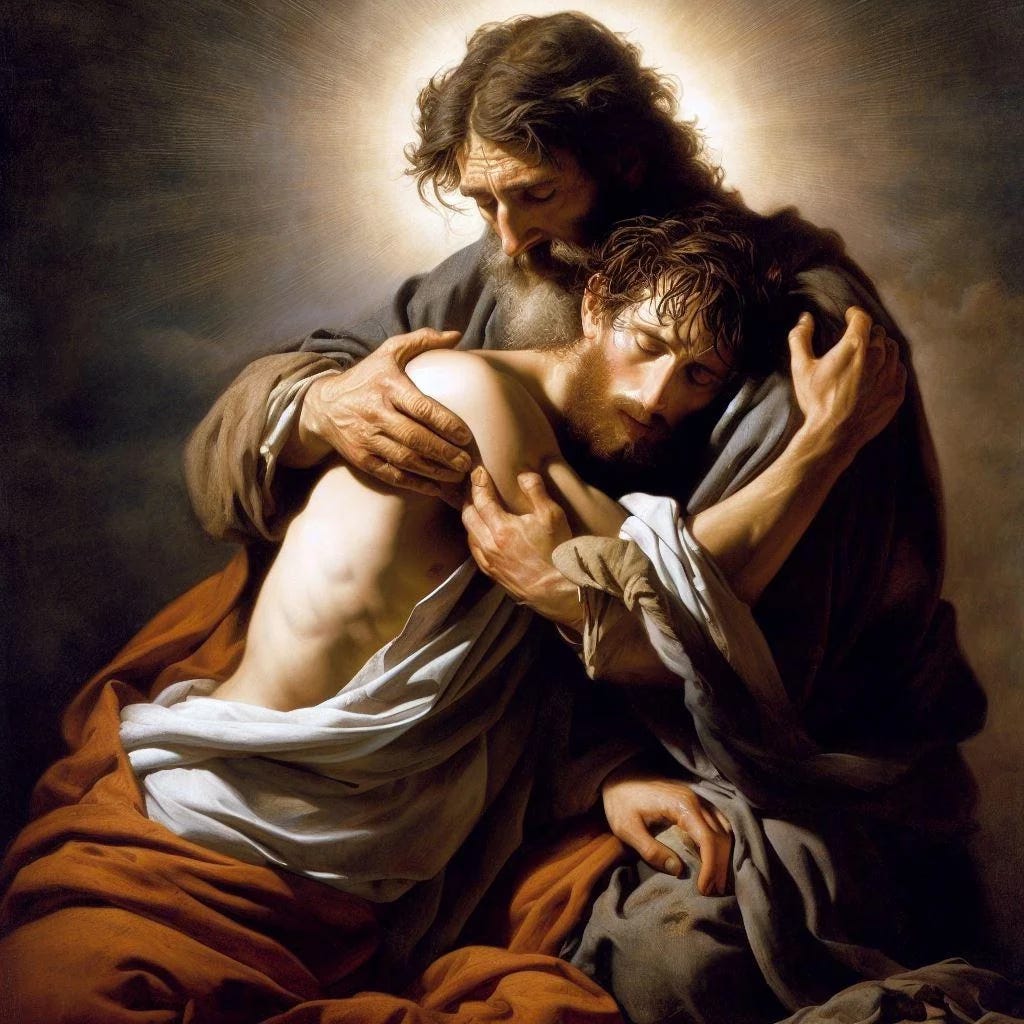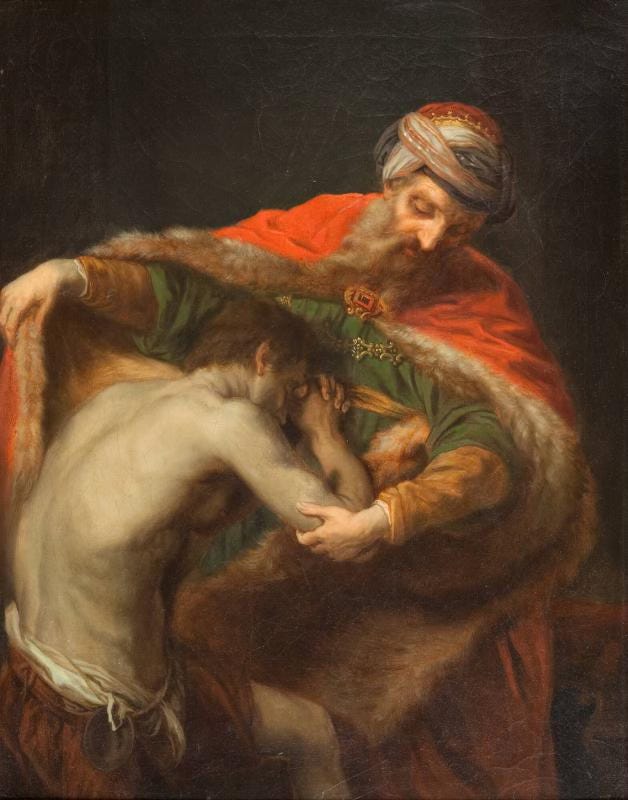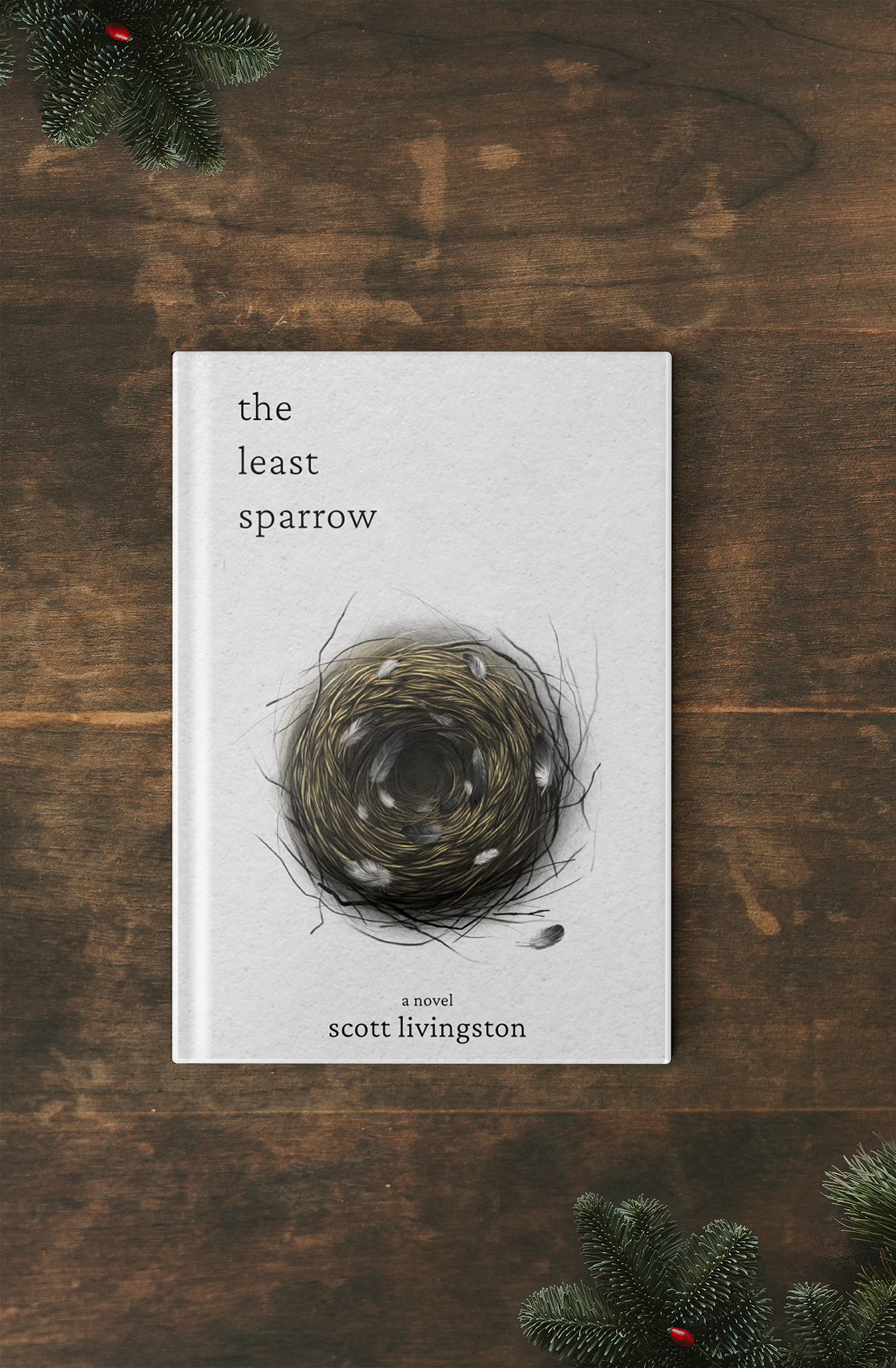Prodigals
"He ran, and fell on his neck, and kissed him"
Never cease loving a person, and never give up hope for him, for even the prodigal son who had fallen most low, could still be saved; the bitterest enemy and also he who was your friend could again be your friend; love that has grown cold can kindle.
Soren Kierkegaard
I was recently given a gift which I now pass along to you, dear friends.
It was an opportunity to teach a lesson about the parable of the prodigal son found in Luke 15. Whenever I am asked to teach, I first try and find myself and my spiritual infirmities in this lesson. This is never hard - the difficult part is limiting the length of the list. I then try and understand the experiences of those I am teaching and what I can share with them that might be helpful in their own spiritual sojourn.
The gift I was given was a new understanding of the central figure in the story. If you had asked me a few weeks ago who I thought it was, I would have said “the prodigal son, obviously.” But I now have a different answer.
The central figure in this parable is the father (whom I believe represents our Heavenly Parents, both Mother and Father.)
Without the father there isn’t a story. Without him there isn’t a home to return to. Without him the prodigal stays lost, hungry, unredeemed. But sometimes we mistakenly believe that the Father sees us differently than the Savior does. I love what Elder Jeffrey R. Holland has taught about this:
Of the many magnificent purposes served in the life and ministry of the Lord Jesus Christ, one great aspect of that mission often goes uncelebrated. His followers did not understand it fully at the time, and many in modern Christianity do not grasp it now, but the Savior Himself spoke of it repeatedly and emphatically. It is the grand truth that in all that Jesus came to say and do, including and especially in His atoning suffering and sacrifice, He was showing us who and what God our Eternal Father is like, how completely devoted He is to His children in every age and nation. In word and in deed Jesus was trying to reveal and make personal to us the true nature of His Father, our Father in Heaven.
I make my own heartfelt declaration of God our Eternal Father this morning because some in the contemporary world suffer from a distressing misconception of Him. Among these there is a tendency to feel distant from the Father, even estranged from Him, if they believe in Him at all. And if they do believe, many moderns say they might feel comfortable in the arms of Jesus, but they are uneasy contemplating the stern encounter of God.
In studying this parable with a focus on the role of the father, several phrases have taken on new meaning. May I share just a few - prodigal to prodigal?
“He began to be in want”
There is often a gap between our sins and the consequences we suffer for them. Sin also has a numbing effect on our sensitivity to God’s efforts to help us to repent. But sooner or later, early or late, we will all “come to ourselves” and realize that the only way to relieve spiritual hunger is to partake of the Bread of Life. The prodigal didn’t know what he was missing until there was no other source of sustenance. This reminds me of another prodigal son, Alma the Younger, and what he remembered his father had taught him when the younger Alma was in extreme spiritual agony.
17 And it came to pass that as I was thus racked with torment, while I was harrowed up by the memory of my many sins, behold, I remembered also to have heard my father prophesy unto the people concerning the coming of one Jesus Christ, a Son of God, to atone for the sins of the world.
18 Now, as my mind caught hold upon this thought, I cried within my heart: O Jesus, thou Son of God, have mercy on me, who am in the gall of bitterness, and am encircled about by the everlasting chains of death.
19 And now, behold, when I thought this, I could remember my pains no more; yea, I was harrowed up by the memory of my sins no more.
Alma 36
Elder Uchtdorf recently taught us about this pivotal moment in the prodigal’s journey home.
It wasn’t just an empty stomach that troubled him. It was an empty soul. He had been so sure that giving in to his worldly desires would make him happy, that moral laws were obstacles to that happiness. Now he knew better. And oh, what a price he had to pay for that knowledge!
As the physical and spiritual hunger grew, his thoughts returned to his father. Would he help him after all that had happened? Even the humblest of his father’s servants had food to eat and shelter from the storms.
But return to his father?
Never.
Confess to his village that he had squandered his inheritance?
Impossible.
Face the neighbors who surely had warned him that he was disgracing his family and breaking his parents’ hearts? Return to his old friends after boasting of how he was breaking free?
Unbearable.
But the hunger, loneliness, and remorse simply wouldn’t go away—until “he came to himself.”
He knew what he needed to do.
“I am no more worthy to be called thy son”
One of the devilish deceptions we sometimes succumb to is the idea that there is a limit to or expiration date for God’s love. Does He tolerate or overlook our sins? No. The prodigal had to regain spiritual consciousness and travel a long and likely rigorous road home before his repentance was complete. As he walked he may have stopped and started many times, second-guessing his decision to return, perhaps imagining how his parents and loved ones would respond.
“You’re not welcome here.”
“You no longer belong to our family. Please leave.”
“You smell awful. When was the last time you took a bath?”
“You’re right. You aren’t worthy. You broke our hearts. We’ll never forgive you.”
Because each of us has “sinned before heaven,” we can appreciate what this younger son may have felt as his home came into view.
Fear. Heartache. Sorrow. Searing shame.
Again from Elder Uchtdorf’s marvelous message:
Who among us has not departed from the path of holiness, foolishly thinking we could find more happiness going our own self-centered way?
Who among us has not felt humbled, brokenhearted, and desperate for forgiveness and mercy?
Perhaps some may even have wondered, “Is it even possible to go back? Will I be labeled forever, rejected, and avoided by my former friends? Is it better to just stay lost? How will God react if I try to return?”
This parable gives us the answer.
Our Heavenly Father will run to us, His heart overflowing with love and compassion. He will embrace us; place a robe around our shoulders, a ring on our finger, and sandals on our feet; and proclaim, “Today we celebrate! For my child, who once was dead, has come back to life!”
Heaven will rejoice at our return.
Forgiving ourselves is often the hardest part of forgiveness. But if this parable teaches us anything, it is that heaven is eager to forgive. It’s as if the Father and the Son are both learning forward, arms open, Their loving eyes fixed upon us, ready to run to us the moment we turn towards home.
President Boyd K. Packer once shared this tender account of a prodigal struggling to forgive herself.
Sometimes, even after confession and paying penalties, the most difficult part of repentance is to forgive one’s self. You must come to know that forgiveness means forgiveness.
“As often as my people repent will I forgive them their trespasses against me.”
President Joseph Fielding Smith told me of a repentant woman struggling to find her way out of a very immoral life. She asked him what she should do now.
In turn, he asked her to read to him from the Old Testament the account of Lot’s wife, who was turned to a pillar of salt. Then he asked her, “What lesson do you gain from those verses?”
She answered, “The Lord will destroy the wicked.”
“Not so!” President Smith said that the lesson for this repentant woman and for you is “Don’t look back!”
“But when he was yet a great way off, his father saw him.”
This is my favorite part. Imagine the Savior coming to this moment in the story. No doubt His listeners were rapt with anticipation.
How would the father respond? Would he allow his wayward son to return? Would he be welcomed home, or would the father righteously rebuke his unworthy child and send him away a second time, never to return?
Were they stunned to hear of the welcome the prodigal received? Not only did his father run to him and embrace him with tears, but he threw a party, holding nothing back, his complete forgiveness symbolized by a robe, a ring, and a fatted calf.
There is so much to think about here.
How does God feel when we repent?
How should we feel about others when they repent?
How can we forgive someone who has betrayed us?
What does it mean to love as God loves?
I close with a poem shared by President Jeffrey R. Holland when he was serving as president of Brigham Young University in a talk titled “A Robe, A Ring, and a Fatted Calf.” It perfectly reflects the feelings of my heart as a prodigal and as one searching for brothers and sisters still trying to find their way home.
He watched his son gather all the goods
that were his lot,
anxious to be gone from tending flocks,
the dullness of the fields.He stood by the olive tree gate long
after the caravan disappeared
where the road climbs the hills
on the far side of the valley,
into infinity.Through changing seasons he spent the light
in a great chair, facing the far country,
and that speck of road on the horizon.Mocking friends: “He will not come.”
Whispering servants: “The old man
has lost his senses.”
A chiding son: “You should not have let him go.”
A grieving wife: “You need rest and sleep.”She covered his drooping shoulders,
his callused knees, when east winds blew chill, until that day . . .
A form familiar, even at infinity,
in shreds, alone, stumbling over pebbles.“When he was a great way off,
His father saw him,
and had compassion, and ran,
and fell on his neck, and kissed him.” (Luke 15:20)
Merry Christmas, friends!
Bonus #1 - If you have a few minutes, search Google Images for “the prodigal son.” There are hundreds if not thousands of artistic portrayals of this beloved story. Here are just a few of my favorites.


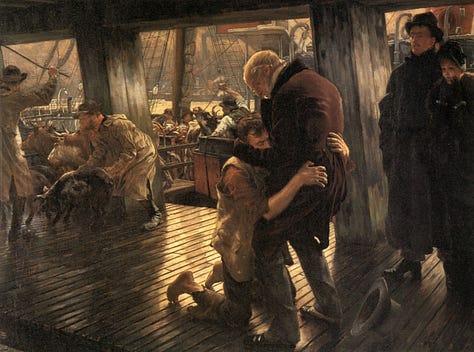
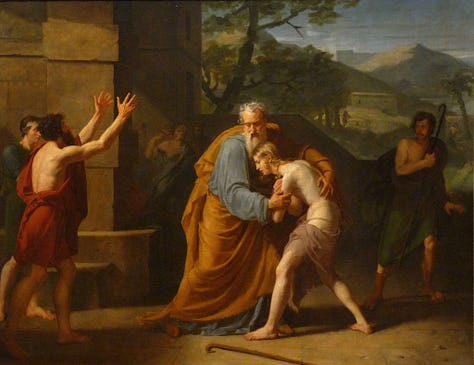


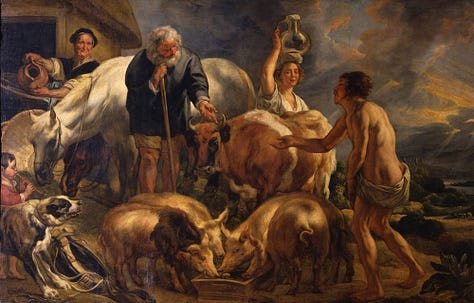
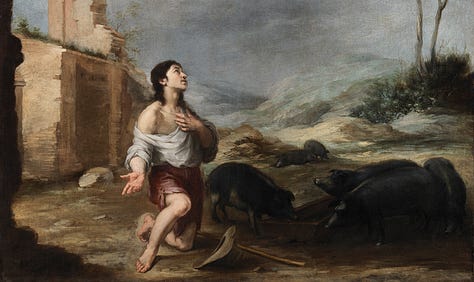
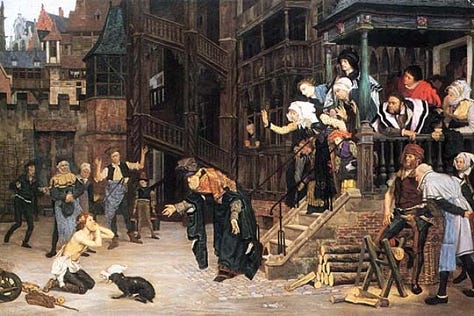
Bonus #2 - Speaking of prodigals, I’ve realized this theme is part of almost every story or screenplay I’ve ever written, including my most recent novel the least sparrow. In fact, the original title of my book was the Christmas sparrow. The story begins and ends at Christmastime. Reviews on Amazon have generally been positive.
If you are looking for a meaningful gift with a message of hope and forgiveness, may I offer my little story of three prodigals trying to find their way home?



